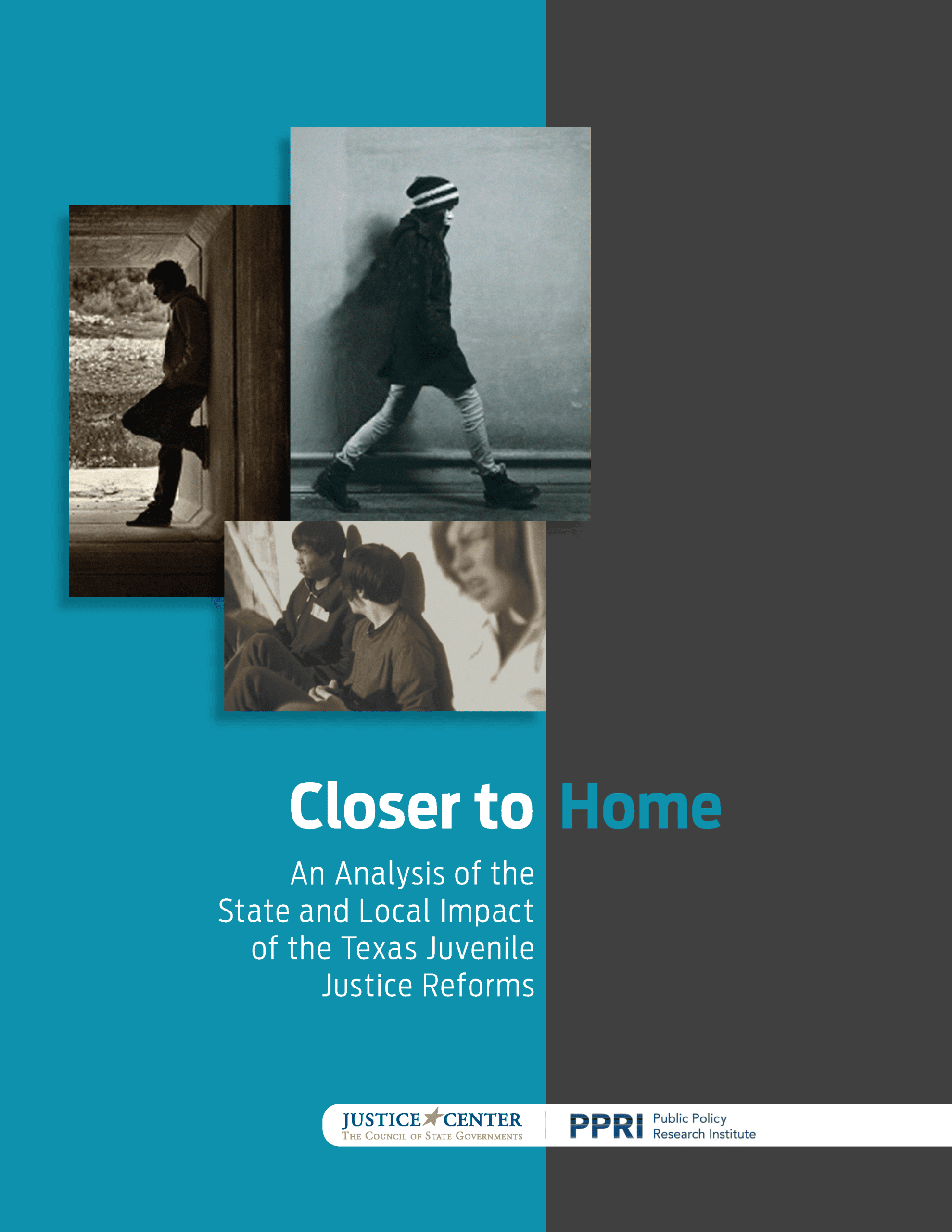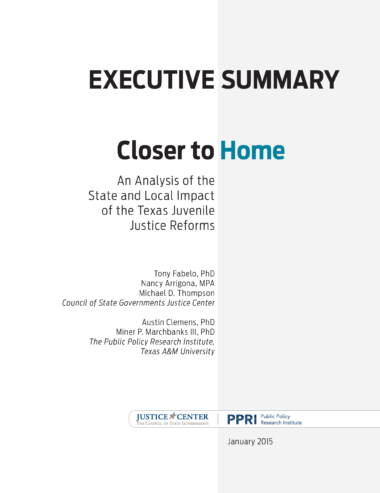Closer to Home: An Analysis of the State and Local Impact of the Texas Juvenile Justice Reforms
A first-of-its-kind study of Texas youth involved with the juvenile justice system shows that juveniles under community-based supervision are far less likely to reoffend than youth with very similar profiles who are confined in state correctional facilities.
Closer to Home: An Analysis of the State and Local Impact of the Texas Juvenile Justice Reforms, which draws on an unprecedented dataset of 1.3 million individual case records spanning eight years, shows youth incarcerated in state-run facilities are 21 percent more likely to be rearrested than those who remain under supervision closer to home. When they do reoffend, youth released from state-secure facilities are three times more likely to commit a felony than youth under community supervision.
The CSG Justice Center unveiled the report on Thursday, January 29, 2015, in a packed room of the Texas Supreme Court, alongside Tennessee Senate Majority Leader Mark Norris, who also serves as chair of CSG, Texas State Sen. John Whitmire, Texas Chief Justice Nathan Hecht, and a number of others.
“The extraordinary data compiled for this study demonstrates convincingly how much better youth—who prior to the reforms would have been incarcerated—fare instead under community supervision,” said Michael D. Thompson, director of the CSG Justice Center. “It also finds that for those youth placed under community supervision, there is still considerable room for improvement.”
The number of incarcerated youth has decreased by more than 40 percent across the nation—with some state populations declining by as much as 80 percent—since 2000, when the number of juveniles incarcerated was at a record high.in the U.S.
Governors emphasized a wide range of criminal justice and behavioral health initiatives in this year’s state-of-the-state addresses. From…
Read MoreCorrections leaders balance the complex priorities of maintaining public safety, operating secure facilities, providing needed care and services…
Read MoreThe CSG Justice Center is pleased to announce 5 new members of its advisory board. Hailing from states…
Read More State of the States: Criminal Justice and Behavioral Health Priorities in 2025
State of the States: Criminal Justice and Behavioral Health Priorities in 2025
Governors emphasized a wide range of criminal justice and behavioral health initiatives in this year’s state-of-the-state addresses. From Alaska to Washington, governors across the U.S. highlighted significant progress in reducing crime rates, combating the opioid crisis, and expanding mental health services. They also noted areas for improvement, some of which will be legislative priorities in 2025.
Read More Apply Now for Resident Analyst Program to Increase Data Analysis Capacity at Departments of Corrections
Apply Now for Resident Analyst Program to Increase Data Analysis Capacity at Departments of Corrections
Corrections leaders balance the complex priorities of maintaining public safety, operating secure facilities, providing needed care and services to the incarcerated population, and coordinating with other agencies.
Read More Five New CSG Justice Center Board Members Look to Strengthen Communities and Improve Public Safety
Five New CSG Justice Center Board Members Look to Strengthen Communities and Improve Public Safety
The CSG Justice Center is pleased to announce 5 new members of its advisory board. Hailing from states across the country and representing multiple professions, they are all eager to join the 17 current members in establishing the policy and project priorities for the organization.
Read More Removing Barriers to Successful Reentry: Q&A with New CSG Justice Center Advisory Board Member Dr. Ronald F. Day
Removing Barriers to Successful Reentry: Q&A with New CSG Justice Center Advisory Board Member Dr. Ronald F. Day
The CSG Justice Center Advisory Board establishes the policy and project priorities of the organization. The board features a cross-section of leaders who shape criminal justice policy in various parts of the country.
Read More Transforming Lives with Access to Needed Mental Health Care: Q&A with New CSG Justice Center Advisory Board Member Dr. Courtney Harvey
Transforming Lives with Access to Needed Mental Health Care: Q&A with New CSG Justice Center Advisory Board Member Dr. Courtney Harvey
The CSG Justice Center Advisory Board establishes the policy and project priorities of the organization. The board features a cross-section of leaders who shape criminal justice policy in various parts of the country.
Read More Six States Commit to Improving Statewide Strategies to Address Youth Crime, Violence and Behavioral Health
Six States Commit to Improving Statewide Strategies to Address Youth Crime, Violence and Behavioral Health
The Council of State Governments (CSG) Justice Center has launched the Collaborating for Youth and Public Safety Initiative (CYPSI) in partnership with six states: California, New Mexico, New York, Ohio, Oklahoma, and Rhode Island. The initiative will help states develop, fund, and effectively implement a research-based service continuum to improve public safety and behavioral health, education, and other outcomes for youth.
Read More











